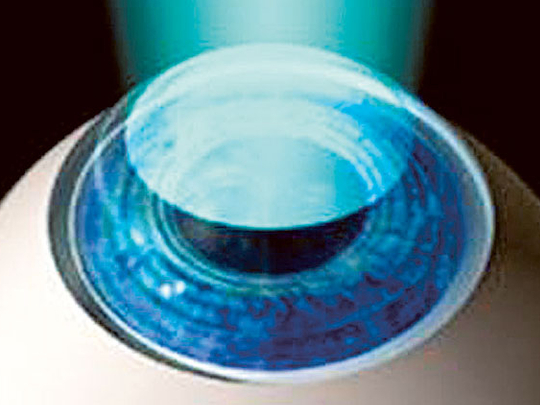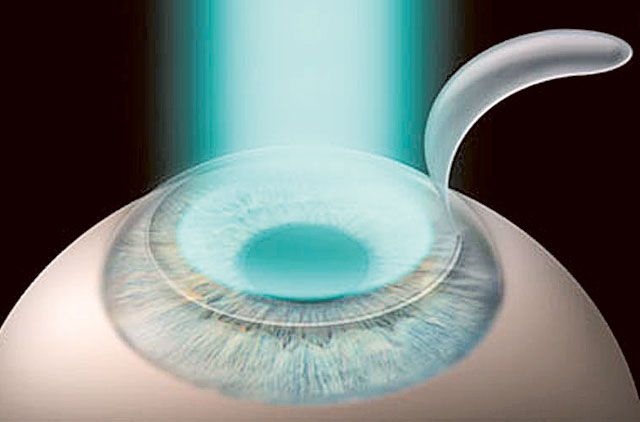
Dubai: Despite having a high success rate, doctors are warning patients who are considering laser or LASIK eye procedures that they must meet certain conditions before proceeding with the surgery.
Introduced around two decades ago, the procedures still attract millions of people worldwide who are looking to free themselves of the inconvenience of wearing glasses and lenses, and want to attain perfect vision within minutes. However, are they a suitable solution for everyone?
Gulf News spoke with Dubai resident Nada Shaief from Yemen about how she feels about the procedure six years after undergoing it.
“I felt like I was born again,” Nada said, adding that LASIK surgery has changed her life.
With her eye number at 4.5, Nada was constantly experiencing the hassle of having to wear spectacles and lenses. But her decision to opt for the 15-minute procedure was worth the risk. “The procedure was very uncomfortable, but to wake up and be able to see everything around you clearly is an amazing feeling,” she said. “Six years later, I still have perfect vision.”
Benefits
Twenty-six-year-old Yousuf Ahmad underwent the laser eye procedure and is still enjoying the benefits. “I underwent the surgery eight years ago, as soon as I turned 18, because I was always breaking and losing my glasses and was very uncomfortable wearing lenses.”
With no post-surgery complications, Ahmad said he was not hesitant about recommending it to other members of his family.
Laser surgery involves the use of laser to change the shape and focus of the cornea to achieve perfect or near perfect vision.
However, to be eligible for it, a patient should be over 18 years of age with stable eyesight for at least a year, and should not have a history of any significant eye condition such as glaucoma or ulcers, Dr Millicent Grim, specialist ophthalmologist and Laser specialist at the Gulf Eye Centre, Dubai, said.
There are other criteria as well to guarantee successful results. “The patient’s eye number should be below 6 or maximum at 8 if they are near-sighted, and below 4.5 if they are far-sighted to be a candidate for the surgery.” Another crucial element assessed for eligibility of surgery is the amount of tissue available in each case. It is a decisive factor because less depth of tissue in the eye would make it difficult for surgical efficacy.
Caveat for pregnant women
Pregnant women, however, are not permitted to undergo the procedure until six weeks after delivery if they are not nursing. “Hormones during pregnancy can result in a false reading when taking an eye test,” Dr Grim said.
When deciding on the surgery, a few factors are vitally important to consider — the first set of tests is crucial in determining the patient’s eligibility for the surgery and the type of laser procedure needed. The pupil size, moistness of the eyes, and the thickness and curvature of the cornea are the main factors that are evaluated by the laser specialist to make the decision.
Depending on the tests, the ophthalmologist will be able to determine whether a patient needs the LASIK or surface laser procedure. In LASIK, a thin flap is created on the cornea, corneal tissue removed and reshaped, which helps change the focus, and the flap closed, Dr Grim explained.
In the surface laser procedure, no flap is created; instead the cornea’s entire outer layer is removed to change the focus for more clarity of vision.
In most cases, patients need only one laser procedure to achieve the desired results. However, 5 to 10 per cent of patients usually need another follow-up enhancement laser surgery three months later, Dr Grim said.
Risks
With over a 98 to 100 per cent success rate, laser eye surgery has become one of the most common cosmetic surgeries with speedy and impressive results. Yet, there are many who remain wary of the risks.
One of the common post-surgery risks of laser vision correction, if done when all conditions are not satisfactorily met, said Dr Grim, is low vision. “There isn’t an immediate risk of blindness but there is a very high risk of low and poor vision after the surgery,” she said.
Does laser work after 40?
Dr Pramod Warhekar, consultant ophthalmologist at Mediclinic City Hospital, pointed out that for many individuals over the age of 40, undergoing the procedure will not guarantee that they will not need glasses. “For patients over 40, it is almost certain that they will need glasses for reading after the surgery unless they go for mono-region procedure where one eye is corrected for far and the other for near vision”.
According to Dr Warhekar, the mono-region approach is more common among women than men, as they are more self conscious about having to wear glasses. “Many women patients have complained that they don’t like to pull out their glasses every time they want to read a message on their phone, or to read the menu at a restaurant — but for men, it doesn’t seem to be an issue.”













